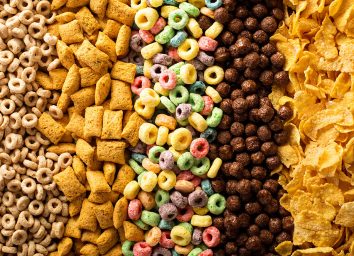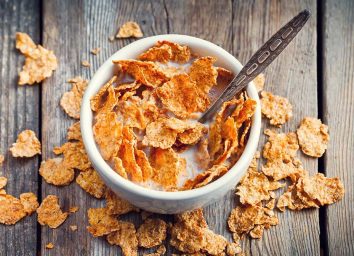Ugly Side Effects of Eating Cereal Every Day, According to Science

While Dr. John Harvey Kellogg had good intentions behind creating a breakfast cereal — to promote digestive health, help reduce the intake of fatty foods at breakfast, and offer a convenient source of healthy foods — American cereal manufactures have diverged from this guidepost.
Now, many breakfast cereals are loaded with sugar and devoid of digestion-supporting fiber — essentially the opposite of what Dr. Kellogg wanted.
It's time to take a closer look at our cereal habits. Although many of us have continued this cherished childhood meal into adulthood, we have to recognize that this breakfast food is closer to a sugary treat than it is a well-balanced meal that has enough nutrients to fuel our health. (It's worth mentioning: the cereal industry has made incredible strides over the past two decades, and there are now countless healthy cereal options.)
Keep reading to learn about why we'd like you to reconsider relying on cereal for breakfast, and for more, check out 21 Best Healthy Cooking Hacks of All Time.
You won't feel full.

Ever feel like you have cereal for breakfast and end up feeling more hungry than when you poured a bowl? You can thank most cereals' lack of digestion-slowing macronutrients like healthy fats, fiber, and protein. Rather, breakfast cereals tend to be all carbs—most of which are blood-sugar-spiking sugar. In fact, sugar tends to be the second ingredient on a cereal box's nutrition facts panel just behind refined wheat, corn, or rice. The result is that most cereals are considered to be high on the glycemic index: a number that indicates how much a particular food will raise blood sugar levels. The more rapidly your blood sugar spikes, the more quickly it can fall, which can trigger feelings of hunger.
Don't forget to sign up for our newsletter to get the latest food and nutrition news delivered straight to your inbox.
You'll eat more food the rest of the day.

Having such a high-carb, low-protein meal for breakfast can set you up to be unsatisfied and may lead to eating more food over the course of the day than if you had a healthier breakfast. A study published in European Journal of Nutrition examined the difference between eating an egg breakfast and a cereal breakfast on calorie intake for the rest of the day. Researchers found that not only did participants report feeling more satisfied and having less hunger when they consumed eggs than they did cereal, but they also saw that egg eaters consumed 438 fewer calories throughout the day than those who poured themselves a bowl of cereal.
Eat less throughout the rest of the day: replace your cereal habit with any of these 19 High Protein Breakfasts That Keep You Full.
You're more likely to gain weight.

Combine the fact that cereal can cause you to consume more calories throughout the day and that its high GI can cause spikes and crashes in blood sugar, and you have a recipe for weight gain. Specifically, studies show that diets rich in high-GI foods like rice and corn-based cereals make it harder to lose weight than those with more low-GI foods.
You'll have a harder time managing your diabetes.

The CDC has found that over 1 in 10 Americans have diabetes and 1 in 3 have prediabetes: a condition where blood sugar levels are higher than normal, putting you at increased risk of developing type 2 diabetes, heart disease, and stroke. Low-GI diets have been linked to benefit diabetes management, increase levels of "good" HDL cholesterol, lower triglycerides, and reduce the risk of cardiovascular (heart) problems. What's our point? When researchers analyzed 12 studies on diabetes and glycemic index foods, they found that low-GI diets helped to improve glycemic control and lowered levels of glycated albumin, a marker of diabetes, but the same results were not found for high-GI diets.
You'll likely eat more cereal—and sugary foods.

Sugar begets further sugar consumption. And that's certainly true of high-sugar cereal. One group of researchers specifically studied this phenomenon. When they had children receive either a breakfast of high-sugar cereal or low-sugar cereals, children who had the high-sugar cereals consumed significantly more cereal (61 grams vs. 35 grams in the low-sugar condition) and almost twice the amount of refined sugar in total (24.4 grams vs. 12.5 grams). The Pediatrics study concluded that compared with serving low-sugar cereals, high-sugar cereals increase children's total sugar consumption and reduce the overall nutritional quality of their breakfast. We may not be kids anymore, but there are certainly some takeaways we can learn from this study: skip the sugary breakfast cereals! And maybe try any of these 25 Best Yogurts for Weight Loss, According to Nutritionists.







